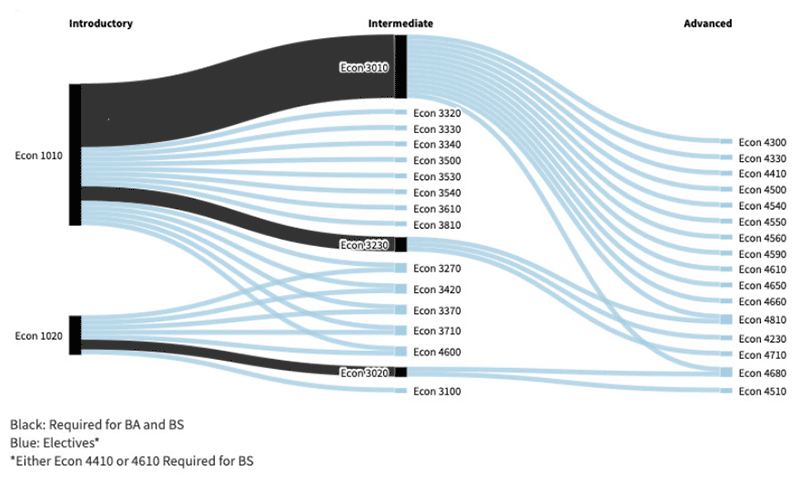| Guidance | Reasoning |
|---|---|
| Take Econ 1010 and Econ 3010 earlier rather than later | Econ 1010 is a prerequisite for all 3000-level electives except 1, and Econ 3010 is a prerequisite for all 4000-level electives except 3 Taking Econ 1010 and 3010 earlier will give you more flexibility later |
Take the statistics requirement and Econ 3230 earlier rather than later Recommendation: Take statistics requirement by end of sophomore year and Econ 3230 by end of junior year | Most faculty only consider students for RA positions or as Honors Thesis advisees if they have done well in Econ 3230 first Econ 3230 introduces data analysis, which can be a valuable skill for internship and job applications |
| Take a few electives that sound interesting early on | If you are unsure about majoring in economics, taking one to two electives in freshman or sophomore year allows you to explore topics and professors that may inspire you Taking electives earlier (especially 4000-level) allows you to meet faculty with whom you may want to work as an RA or on an Honors Thesis |
Course Prerequisite Chains

Economics Electives by Interest
Health Economics
- Econ 3270: Economics of Pandemics
- Econ 3500: Economics and Health Care Reform
- Econ 4300: Regulation Econ
- Econ 4500: Health Economics and Policy
Labor and Education
- Econ 3320: Urban Economics
- Econ 3710: Economics of Education
- Econ 3810: Labor Economics
- Econ 4650: Labor and Population in Latin America
- Econ 4710: Econ. of Education Policy and Reform
Public Policy
- Econ 3340: Government and the Economy
- Econ 4300: Regulation
- Econ 4500: Health Economics and Policy
- Econ 4540: Public Finance and Public Policy
- Econ 4550: Using Big Data to Solve Econ. Problems
- Econ 4680: Economics of Poverty
- Econ 4710: Econ. of Education Policy and Reform
Statistics and Mathematical Economics
- Econ 3610: Games and Strategic Behavior
- Econ 4230: Econometrics
- Econ 4410: Topics in Mathematical Economics
- Econ 4550: Using Big Data to Solve Econ. Problems
- Econ 4610: Game Theory
Economic Development
- Econ 3320: Urban Economics
- Econ 3540: Development Economics
- Econ 4590: Econ. Development of Latin America
- Econ 4600: Inequality and Poverty in Latin America
- Econ 4650: Labor and Population in Latin America
- Econ 4660: Seminar on Latin American Countries
- Econ 4680: Economics of Poverty
International and Macroeconomics
- Econ 3100: Economics of Money and Banking
- Econ 3370: World Economy
- Econ 3540: Development Economics
- Econ 4330: International Trading Relations
- Econ 4510: Advanced Topics in Macroeconomics
- Econ 4560: Comparative Economic Systems
Environmental Economics
- Econ 3330: Environ. & Natural Resource Economics
- Econ 3530: Global Food Economy
Economic History
- Econ 3420: Economic History of the U.S.
- Econ 4810: Economics of Slavery
* These categories are only suggestions. Some courses may fit in more categories than displayed above. Not all courses are offered every semester. Check the Economics Department website for more information. See the Tulane Schedule of Classes and the Complete Economics Course List.
Example Economics Major Course Sequence*
Freshman Year
Fall
- Econ 1010: Introductory Microeconomics
- Math 1210: Calculus I (B.S. Only)
Spring
- Econ 1020: Introductory Macroeconomics
- 3000-Level Elective
Sophomore Year
Fall
- Econ 3010: Intermediate Microeconomics
- 3000-Level Elective
Spring
- Declare Major
- Math 1220: Calculus II (B.S. Only)
- Statistics Requirement: Math 1110, Math 1140, Math 1230, or Math 3070
Junior Year
Fall
- Econ 3230: Econometrics
- 3000-Level Elective
Spring
- Econ 3020: Intermediate Macroeconomics
- 4000-Level Elective
Senior Year
Fall
- 4000-Level Elective
Spring
* This course sequence is only an example. You are not required to take these courses in the order or semester listed above. Not all courses are offered every semester. Check the Economics Department website for general guidance and more information. See the Tulane Schedule of Classes and the Complete Economics Course List.

